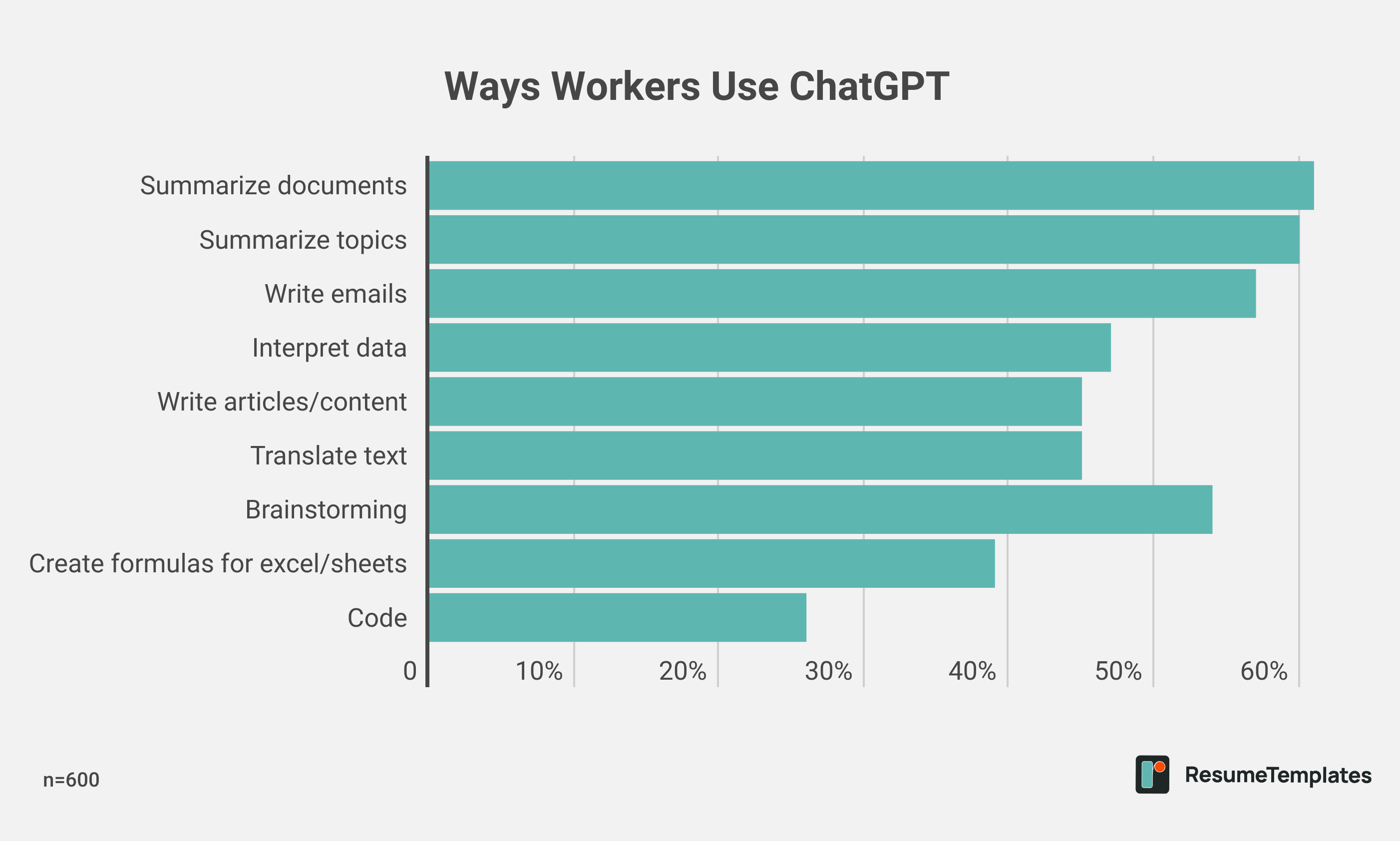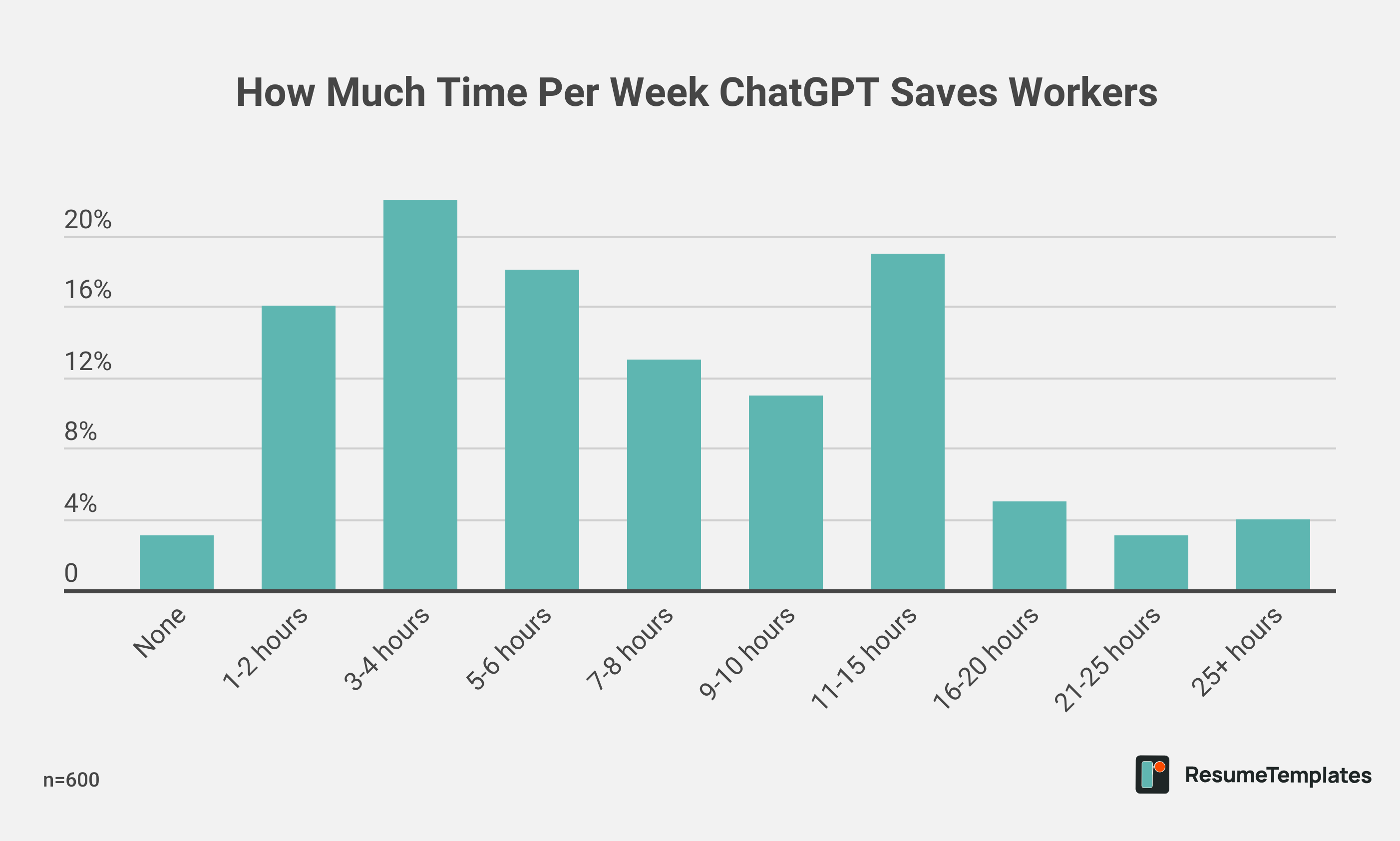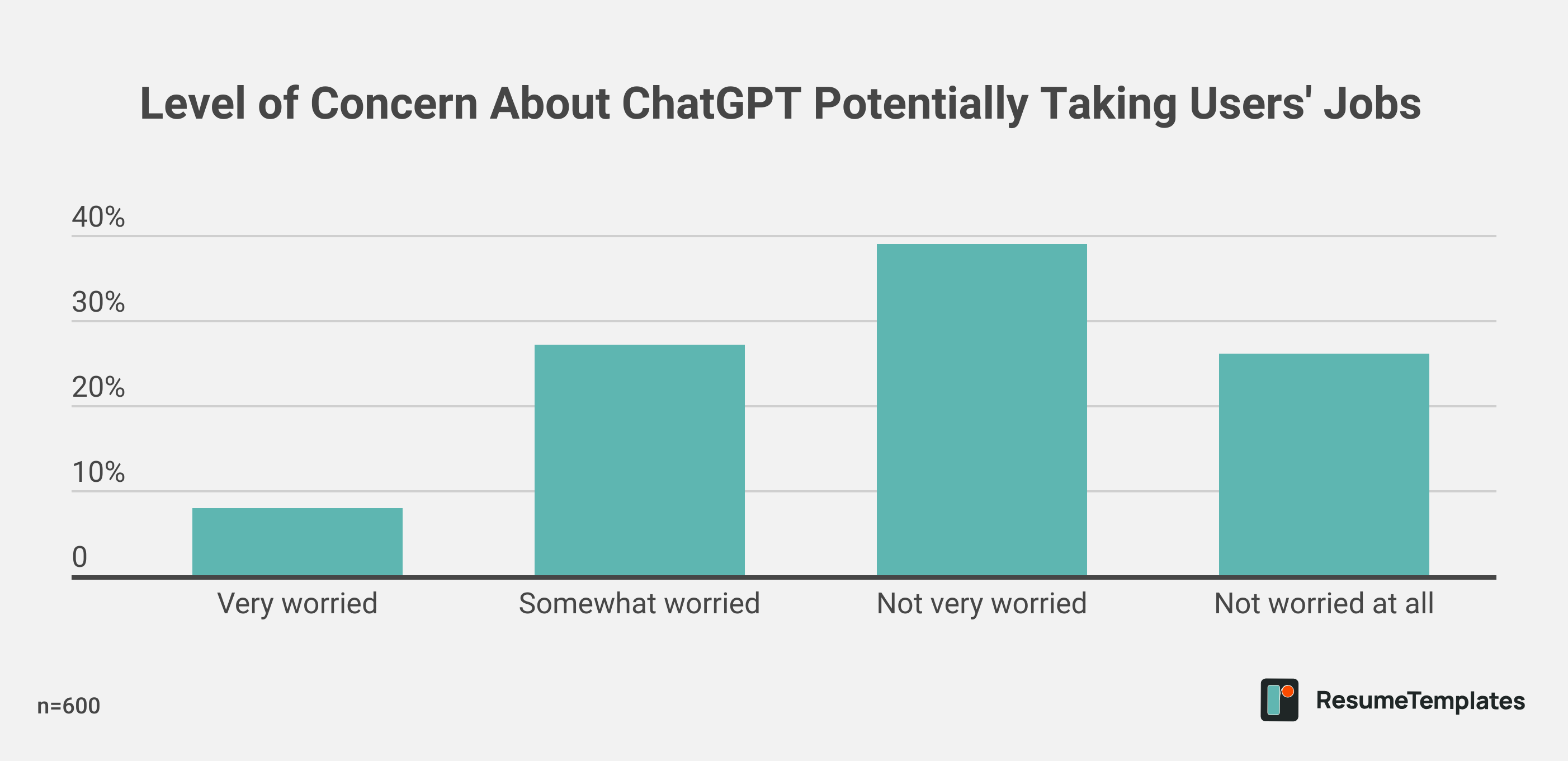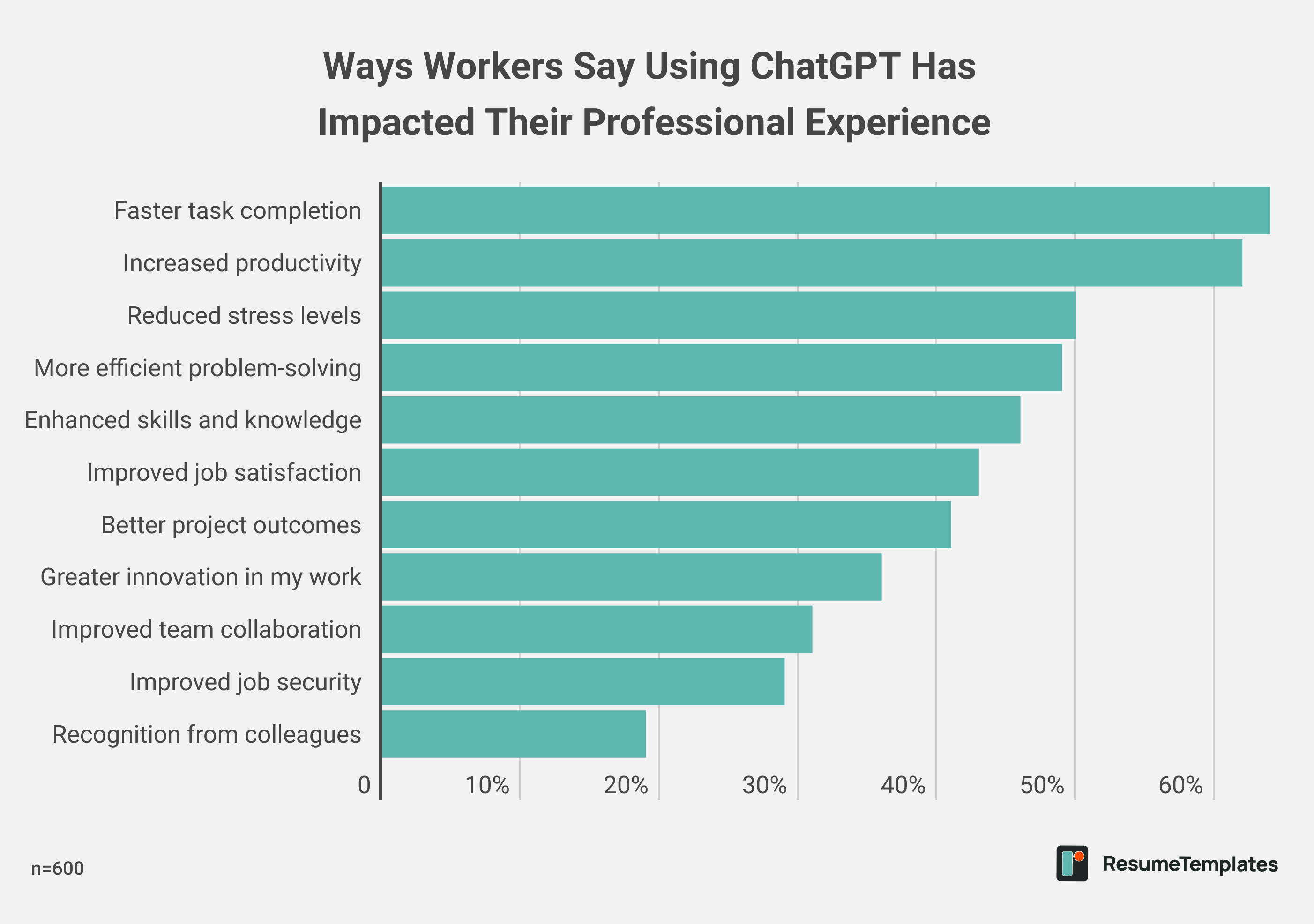Since its launch in November 2022, workers have increasingly used ChatGPT. Its ability to aid in productivity, problem-solving, and communication has made it a valuable tool in various professional settings.
In June, ResumeTemplates.com surveyed 1,666 U.S. employees who spend most or all of their workday on a computer to understand how prevalent ChatGPT use is among workers. We found 34% of employees use ChatGPT weekly.
Study highlights:
- 34% of workers use ChatGPT weekly in their jobs
- 1 in 5 ChatGPT users save over 10 hours per week
- 32% of workers using ChatGPT started a side hustle with time savings
- 4 in 10 workers who use the tool say ChatGPT helped them secure a raise, and 30% report it aided a promotion
- 65% of workers who use the tool say they aren’t worried ChatGPT will take their job
1 in 3 Workers Use ChatGPT Weekly
Nearly four in 10 (36%) workers surveyed say they use ChatGPT on a monthly basis at work. More specifically, 22% of workers use ChatGPT for work daily, 12% use it weekly, and 2% use it monthly.
According to the data, the most common tasks workers use ChatGPT for include summarizing documents (61%) and summarizing topics (60%). Writing emails (57%), brainstorming (54%), interpreting data (47%), translating text (45%), and coding (26%) are also common uses.

“The enhanced utility of ChatGPT for reviewing data inputs and responding to specific prompts has led to higher adoption compared to previous information technology and software tools.
“Additionally, many employees credit ChatGPT proficiency as a key factor in securing raises or promotions,” says ResumeTemplates’ executive resume writer and career coach Andrew Stoner.
1 in 5 Say the Tool Saves Them More Than 10 Hours per Week
Using ChatGPT saves most workers a significant amount of time each week. Notably, 16% of workers say they save one to two hours, 22% report three to four hours, and 30% say five to eight hours. Additionally, 11% save nine to 10 hours, and 18% claim more than 10 hours per week. Only 3% report that the tool doesn’t save them any time each week.

7 in 10 allocate time saved to themselves; many started a side hustle
Regarding reinvestment of saved time from using ChatGPT, 33% of respondents put all of the time they save back into the company. On the other hand, 61% reinvest only some of the time, and 7% do not reinvest any of the time they save using the tool back into the company.
The top reasons respondents put at least some of their saved time back into the company are they want to develop new skills (58%), they think it’s the right thing to do (56%), and they want to improve their job security (44%).
Of those who aren’t putting all of the time they save using ChatGPT back into the company, half say their employer is aware they are working fewer hours per week, while 35% say their employer is unaware, and 15% aren’t sure if their employer knows or not.
Those who have kept time for themselves have started a side hustle (49%), and 11% have taken on a second job.
4 in 10 Workers Who Use the Tool Say It Helped Them Earn a Raise
Of the respondents, 38% have seen a raise as a result of using ChatGPT, while 29% report using the tool aided them in getting a promotion.
The use of ChatGPT has had a significant impact on respondents’ professional experience across various metrics.
Workers say the tool has helped them complete tasks more quickly (64%), be more productive (62%), and reduce stress levels (50%). Additionally, workers report ChatGPT allowed them to more efficiently problem-solve (49%), enhance skills and knowledge (46%), improve job satisfaction (43%), and achieve better project outcomes (41%). Furthermore, workers say the tool allowed for greater innovation in their work (36%), improved job security (29%), better team collaboration (31%), and more recognition from colleagues and supervisors (19%).

“Workers report that ChatGPT assists them in completing assignments more quickly and delivering higher quality results. This combination creates a win-win scenario for employers and workers, and I believe signals an eagerness on the part of workers to learn and adapt to new technology,” says Stoner.
2 in 3 Workers Who Use ChatGPT Don’t Fear Losing Their Job to It
Respondents who use ChatGPT expressed varying levels of concern regarding job displacement by the tool. Approximately 8% indicate being very worried, while 27% report being somewhat worried. A larger segment, comprising 39%, state they are not very worried about ChatGPT impacting their job security, and 26% are not worried at all.
Those who were not concerned about ChatGPT taking their jobs cited several reasons. Over half (51%) believe their roles require human creativity and intuition that AI cannot replicate, and 49% express confidence that AI will augment their job roles rather than replace them entirely.
Additionally, 35% say their jobs involve complex decision-making processes that current AI technologies cannot handle, 22% say they work in industries they believe AI cannot disrupt, and 19% note that AI technology is still too immature to fully replace their job functions.

“Whether workers should fear ChatGPT or AI taking their jobs largely depends on the industry and specific job functions, as the use and capabilities of ChatGPT are still being explored and tested. However, I suggest a more prescient perspective put forward by Professor Richard Baldwin of the Geneva Graduate Institute in Switzerland, ‘AI won’t take your job, it is somebody using AI that will take your job,’” says Stoner.
Workers are optimistic about how ChatGPT can benefit them
Workers who use ChatGPT believe their use of the tool is likely to positively impact their careers in several ways. Specifically, 72% find it likely the tool will help them secure a promotion at their current job, while 74% believe it will help them get a raise.
Additionally, 74% believe it will aid them in getting a more advanced role or receiving a job offer with higher pay (73%).
Finally, 74% believe it will increase their level of job security.
This survey was conducted on June 26, 2024. In total, 1,666 U.S. respondents who spend most of their day on a computer were surveyed. Out of these, 600 respondents took the full survey. To take the full survey, respondents had to answer that they use ChatGPT at least once a month at work. Appropriate participants were selected via demographic criteria and screening questions.
Resume Templates offers free, HR approved resume templates to help you create a professional resume in minutes. Choose from several template options and even pre-populate a resume from your profile.